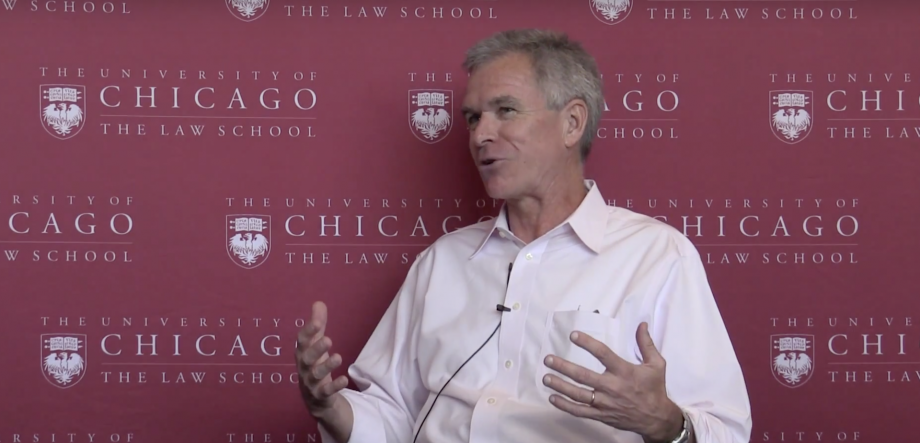My Chicago Law Moment: Fresh Out of the Law School, David Cross, ’80, Applied Posnerian Analysis—and Felt the Impact of the UChicago Way

My Chicago Law Moment is a new series highlighting the Law School ideas, experiences, and approaches that have impacted our students and alumni. Video produced by Will Anderson.
Early in his career, David Cross, ’80, briefly worried that he hadn’t learned the right stuff at the Law School. This was mostly because he’d learned different stuff, a fact his professors had both warned him about and extolled. The UChicago way, they’d said, was about learning how to think—it was more rigorous, it was different, it was better.
But how much better wouldn’t become apparent until later.
“One of the great things about this place is that you learn large concepts and how to analyze legal issues,” said Cross, an intellectual property litigator in Milwaukee. “You don’t necessarily learn all of the legal rules, and I was a little worried when I went into practice that maybe that was going to be a hindrance.”
That was before Cross had the opportunity to apply the legal analysis of Professor Richard Posner, who recently had become a judge on the Seventh Circuit Court of Appeals, while everyone else on his team was struggling to apply a narrower, more typical set of parameters. It was Cross’s Chicago Law Moment—the click, the aha!, the flash of clarity about what a Law School education really means—and it came during a mass tort case when he was a new lawyer.
At the Law School, Cross had taken Torts with Posner, who told the class that their peers at other law schools were going to be learning “that a tort required proof of duty, breach, causation, and damages—but that we weren’t really going to be doing it that way,” Cross said. Instead, Posner “taught us bigger concepts, much more useful concepts.”
Still, when Cross found himself surrounded by colleagues who saying the exact words Posner had predicted they’d say, Cross thought, “Uh oh.”
“My colleagues were all talking about duty, breach, causation, damages and trying to figure out what sort of duty our client, who was in a chain of distribution, would have,” Cross said. “And of course we couldn’t find a case that said: when you’re here in the distribution chain, this is your duty. That didn’t really surprise me much. But when I heard all this talk of duty, breach, causation, damages, I was starting to worry that maybe my Law School education wasn’t going to be that useful.”
Then the Law School thinking kicked in, and Cross offered his colleagues a new way to view duty.
“We proceeded to do a Posnerian analysis, and everybody said, ‘Well, we’ve got nothing else,’ so we wrote up a brief to explain to a federal judge in Wisconsin what our client’s duty would be and why—and the judge accepted it.”
It was a big help to the case, and an eye-opening moment for Cross.
“One of the things you learn at the Law School is that you’re really not learning much about the day-to-day practice of law, which frankly I think is just fine,” Cross said. “It didn’t strike me at the time as being a particularly useful or unique way to learn about the law—but in practice it really ended up proving its value.”